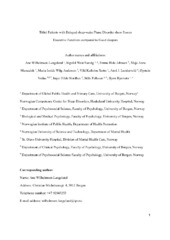| dc.contributor.author | Wilhelmsen-Langeland, Ane | en_US |
| dc.contributor.author | Saxvig, Ingvild W. | en_US |
| dc.contributor.author | Johnsen, Emma Hole | en_US |
| dc.contributor.author | Marszalek, Maja Anna | en_US |
| dc.contributor.author | Andersen, Maria Isolde Wiig | en_US |
| dc.contributor.author | Sætre, Vild Katrine | en_US |
| dc.contributor.author | Lundervold, Astri | en_US |
| dc.contributor.author | Vedaa, Øystein | en_US |
| dc.contributor.author | Nordhus, Inger Hilde | en_US |
| dc.contributor.author | Pallesen, Ståle | en_US |
| dc.contributor.author | Bjorvatn, Bjørn | en_US |
| dc.date.accessioned | 2020-03-16T08:31:33Z | |
| dc.date.available | 2020-03-16T08:31:33Z | |
| dc.date.issued | 2019-02 | |
| dc.Published | Wilhelmsen-Langeland AB, Saxvig IW, Johnsen, Marszalek, Andersen, Sætre, Lundervold A, Vedaa Ø, Nordhus IH, Pallesen S, Bjorvatn B. Patients with delayed sleep-wake phase disorder show poorer executive functions compared to good sleepers. Sleep Medicine. 2019;54:244-249 | eng |
| dc.identifier.issn | 1389-9457 | |
| dc.identifier.issn | 1878-5506 | |
| dc.identifier.uri | https://hdl.handle.net/1956/21501 | |
| dc.description.abstract | Objective: Delayed Sleep-Wake Phase Disorder (DSWPD) is associated with negative outcomes, including reduced daytime performance and difficulties with treatment adherence. These outcomes are mediated by executive functions (EF). In this study, we investigated whether patients with DSWPD report inferior EF compared to a control group. The study consisted of 40 patients diagnosed with DSWPD (12 males, mean age 20.7 (±3.1)) and 20 healthy controls (six males, 21.3 (±2.2), p = 1.00) between 16 and 25 years (p = 0.42). Methods: Behavior Rating Inventory of Executive Function-Adult version Self-Report (BRIEF-A) was used for adults ≥18 years (DSWPD n = 28; controls n = 17) whereas Behavior Rating Inventory of Executive Function Self-Report Version (BRIEF-SR) was used for assessment of EF in adolescents <18 years (DSWPD n = 12; controls n = 3). Independent samples t-tests were used to compare patients to controls. Results: The total group of patients with DSWPD scored significantly poorer compared to the control group on the main indexes; Behavioral Regulation Index (BRI) (p = <0.0005), Metacognition Index (MI) (p = <0.0005), and Global Executive Composite (GEC) (p = <0.0005). The adult group with DSWPD scored significantly poorer than the adult control group on eleven of the twelve BRIEF-A scales. Among patients <18 years, the DSWPD-group scored significantly poorer than the control group on 8 of the 13 BRIEF-SR-scales. Conclusion: Patients with DSWPD reported significantly poorer EF compared to controls. Assessment of EF in patients with DSWPD can be valuable for understanding the consequences of the disorder regarding treatment tailoring and adherence. | en_US |
| dc.language.iso | eng | eng |
| dc.publisher | Elsevier | eng |
| dc.rights | Attribution CC BY-NC-ND | eng |
| dc.rights.uri | http://creativecommons.org/licenses/by-nc-nd/4.0/ | eng |
| dc.title | Patients with delayed sleep-wake phase disorder show poorer executive functions compared to good sleepers | en_US |
| dc.type | Peer reviewed | |
| dc.type | Journal article | |
| dc.date.updated | 2020-02-08T15:11:03Z | |
| dc.description.version | acceptedVersion | en_US |
| dc.rights.holder | Copyright 2019 Elsevier | |
| dc.identifier.doi | https://doi.org/10.1016/j.sleep.2018.10.035 | |
| dc.identifier.cristin | 1693143 | |
| dc.source.journal | Sleep Medicine | |

